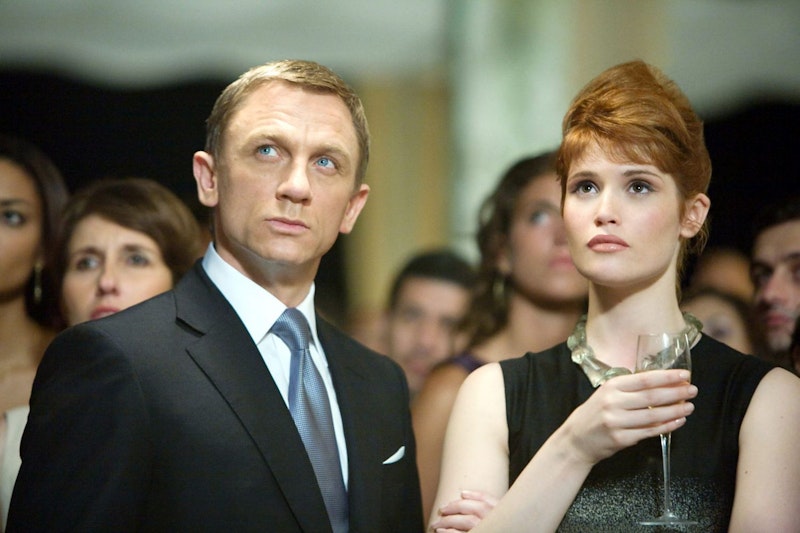In 2006 Casino Royale successfully reinvented the James Bond franchise with a grounded, brutal origin story for MI6 agent 007. In 2008 Quantum of Solace would have to follow up that reinvention. It did so, starting right after the end of Royale, but also chose to build on Royale’s arc for Bond’s character, continuing the process of ramping up Daniel Craig’s rookie Bond back to something like the character we’ve known for decades. That’s a logical move conceptually, but the execution’s uneven.
The story opens with Bond delivering a captured evildoer from the last film to M (Judi Dench) and MI6. The evildoer claims to be an agent of a mysterious conspiracy called Quantum, and is shot by an MI6 agent who’s actually a Quantum double-agent. An investigation leads Bond to Haiti and environmentalist billionaire Dominic Green, who’s up to no good with an exiled Bolivian general. Bond follows Green to a meeting of Quantum executives at an opera, violence occurs, and Bond’s framed for killing an MI6 agent. He refuses to return for questioning and goes after Green in Bolivia with the help of Green’s wife Camille (Olga Kurylenko), actually a Bolivian agent. After an aerial dogfight and a shootout in a luxury hotel, Bond’s left with questions about Quantum, but finds some closure for the traumatic events of the previous movie.
It’s an emotionally coherent installment in Craig’s Bond saga, even if it feels like the middle part of a trilogy. The director this time out is Marc Forster, at 38 the youngest in the franchise’s history. There may be hints of youthful energy to the film, particularly in the opening car chase, but then the film also has critics of the shaky-cam visual style of some of the action. I think the camerawork’s by and large acceptable, but slower reflective sections become even slower by contrast. That’s a pacing choice that to some extent follows on from Casino Royale, though, and it’s worth noting that this is overall the shortest film in the series.
The script comes from the same team of Paul Haggis, Neal Purvis, and Robert Wade who produced Royale, though apparently rewritten heavily during production by Forster and Craig. Either way, the extension of that movie’s conception of Bond’s character into this one follows naturally. Yet there are problems with this approach. The villain is largely disengaged from Bond’s personal quest to come to terms with the events of Royale. He ends up a distraction from the character arc instead of a logical and necessary element in it.
It has to be said, though, that if it’s a strange choice to have Bond going up against an environmentalist billionaire, it’s at least charmingly familiar to see him back fighting billionaires again. Especially, in this case, a billionaire who’s a member of a super-secret criminal organization. You can see the familiar tropes of the Bond films returning, in somewhat altered form. Quantum's got a distinct leadership structure from the classic SPECTRE, and Bond goes after it more deliberately, but the similarities are there even if the ways the groups manifest in the plots of the movies are different.
Then again, another problem is that the film’s too familiar. This is the second in the last three Bond installments to have 007 on the outs from MI6 (and the third in the last seven); it’s also the fourth movie in the last five in which Bond’s main love interest is a spy in some intelligence service or other. And the idea of Bond seeking revenge is familiar as well—there’ve been elements of that in most of the movies since License to Kill. Giving 007 a personal stake in events is only natural, but it’s about time to find new ways to do it.
At least Craig responds intelligently to the development of his character. He’s grim enough that you can almost buy his Bond as a serious character, not so much a faithful take on Fleming’s character as Fleming hybridized with John Le Carré. It’s an odd choice, though, for the film to use a Fleming title from a story absolutely nothing like anything on screen here; the meaning of “a small amount of solace” is the same, and that’s about it. You wonder if the movie isn’t extending itself too far in a quest to find meaning.
At times, here and in Casino Royale, there are ambitions that the nature of Bond films make it impossible to fulfill. These aren’t realist movies that delineate character by realist means. They’re espionage thrillers with a heritage of building worlds with a heightened and occasionally cartoonish reality. When the movies accept that, they can be fascinating. Solace does work, because in the end much of the development of Bond’s character comes through set-pieces in which he does Bond things—notably the sequence at the opera, and a final scene set in Russia. But the climax at the hotel doesn’t do enough.
At their best, these films understand the difference between verisimilitude and realism; they know that they’re not realistic movies, but still must use the appearance of realism, verisimilitude, to give events plausibility. Solace fits in a lot of plot, even with some slow stretches, and if it doesn’t end up in the top tier of Bond films it does effectively build on the promise of the last movie. It takes Craig’s Bond a step further toward the weirdness of his predecessors. Watching it, there’s a sense that if the next movies work, and the overall story of Quantum comes to a satisfying conclusion, then this one will look better in retrospect. Those would turn out to be big ifs.

